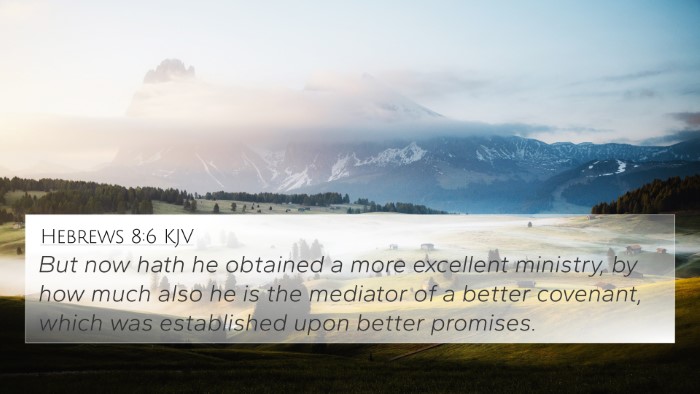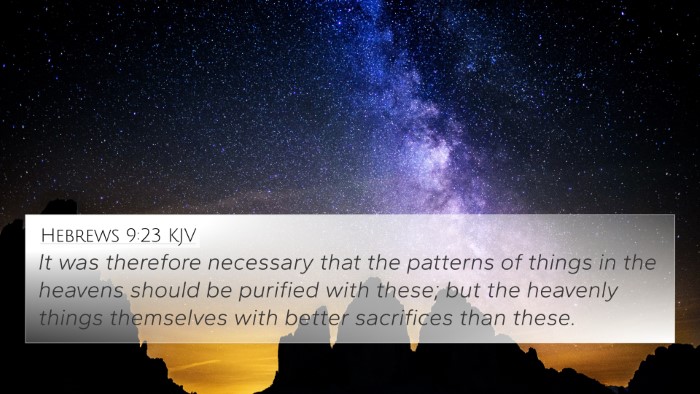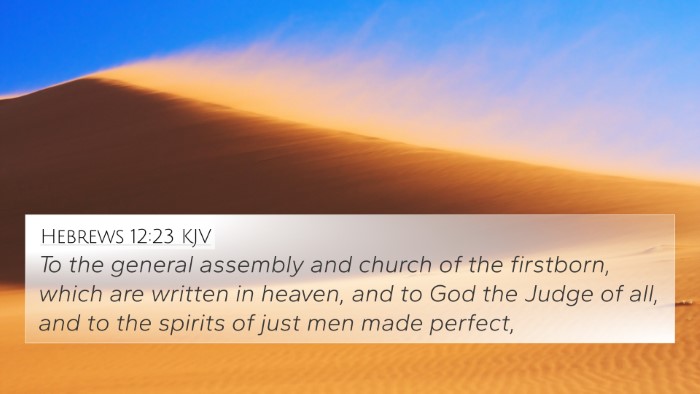Understanding Hebrews 11:40
Hebrews 11:40 states: "God having provided some better thing for us, that they without us should not be made perfect." This verse encapsulates the essence of God's redemptive plan and highlights the unity between the Old Testament faithful and New Testament believers.
Contextual Background
This verse concludes a chapter that is often referred to as the "Hall of Faith," which outlines the exemplary faith exhibited by various biblical figures. It emphasizes how these faithful individuals lived and died before the ultimate revelation of Christ, which provides a comprehensive understanding of faith, salvation, and fulfillment.
Meaning and Interpretation
The meaning of Hebrews 11:40 can be interpreted through various lenses, drawing insights from prominent commentaries:
-
Matthew Henry:
Henry emphasizes God's provision of "better things" through Christ, highlighting that the faithful in the Old Testament awaited the completion of God’s plan, which was fully realized in the New Testament. The phrase "without us" reinforces the necessity of the entire body of believers in God's redemptive history, indicating that we are all part of a larger narrative.
-
Albert Barnes:
Barnes notes that the "better thing" signifies the covenant of grace brought about by Jesus. He explains that the completion of God’s redemptive work includes believers from all ages, suggesting a joint inheritance of eternal life. This intertwined fate points to God's inclusive plan that transcends time.
-
Adam Clarke:
Clarke posits that this verse reflects the completeness of God's redemption, stating that the faith of Old Testament saints was incomplete without the New Testament fulfillment through Christ. This completion emphasizes God's perfect timing and the overarching plan that integrates both testaments.
Biblical Cross References
Hebrews 11:40 is interconnected with several scriptures across the Bible:
- Romans 3:22-23: Discusses righteousness through faith for all who believe, indicating that both past and present believers share in salvation.
- Galatians 3:28: Highlights unity in Christ, indicating that there is no distinction among believers, paralleling the idea of shared faith.
- Ephesians 2:19-22: Illustrates the unity of believers as one household in Christ, connecting us with the faithful of old.
- 1 Peter 1:10-12: Mentions that the prophets sought to understand the grace that would come through Christ, demonstrating a connection to those in Hebrews 11.
- Revelation 6:11: Reveals that those who died in faith will partake in the completeness of God's promise alongside New Testament believers.
- Luke 16:16: Discusses how the law and prophets were until John, indicating a transition to the gospel, which fulfills the old covenant.
- Hebrews 10:1-4: Highlights that the sacrifices of the law were insufficient, pointing to the better sacrifice of Jesus Christ.
Thematic Connections
This verse serves as a bridge, linking themes of faith, perseverance, and redemptive history. Throughout scripture, one can observe the continuity of God's promises:
- Faith: The unifying thread among all believers across time.
- Grace: The dawning of a new covenant fulfilling the promises made to the patriarchs.
- Unity: The shared inheritance of salvation emphasizing collective faithfulness regardless of the timeline of God’s revelation.
Conclusion
In summary, Hebrews 11:40 offers profound insights into God's redemptive plan, encouraging believers to recognize their place in the ongoing narrative of faith. The connections between Bible verses serve as a reminder of the cohesive story of salvation that spans the entirety of scripture.
Tools for Biblical Cross-Referencing
For deeper study, utilizing tools such as a bible concordance, bible cross-reference guide, and bible reference resources can significantly enhance one’s understanding of these connections. Identifying links between the Prophets and Apostolic teachings allows for a more comprehensive exploration of themes and continuity within Scripture.
In conclusion, the verse emphasizes the interconnectedness of biblical texts, illustrating a divine narrative that emphasizes the importance of faith and the collective journey of God’s people.












